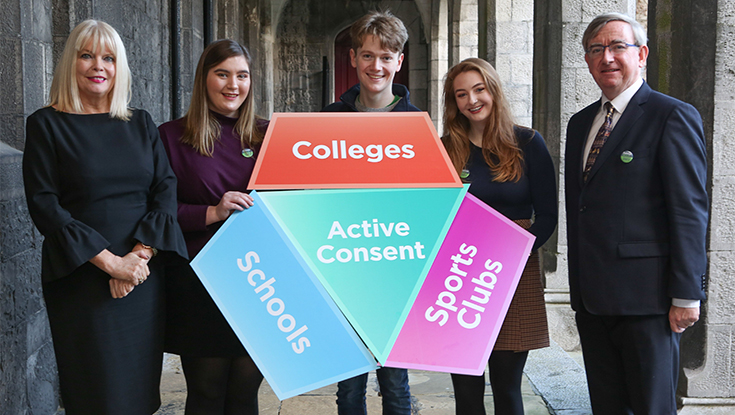
By Julia Tereno
NUI Galway is leading the way on sex education with the launch of the Active Consent Programme, a nationwide initiative to educate third level students on sexual consent.
The Active Consent Programme was officially launched on 11 January by Mary Mitchell O’Connor, Minister of State for Higher Education, and Professor Ciarán Ó hÓgartaigh, President of NUI Galway.
The project, which was created by NUI Galway researchers, creates toolkits for schools, colleges and sports clubs with interactive films and workshops that communicate a sex-positive interpretation of consent.
The four-year programme will be conducted by the SMART Consent team consisting of Dr Pádraig MacNeela, Dr Siobhán O’Higgins, and Kate Dawson from NUI Galway’s School of Psychology, and Dr Charlotte McIvor from the Centre for Drama and Theatre Studies.
The researchers have been involved with the theme for several years, and the Active Consent Programme intends to reach a national level.
The initiative will be funded by Lifes2good Foundation, in partnership with Galway University Foundation and NUI Galway.
“Lack of knowledge leaves children vulnerable to sexual coercion and violence,” said Dr Siobhán O’Higgins, a member of the team conducting the project.
Dr O’Higgins was also one of the researchers behind the SMART Consent workshops that were launched in the university in 2018.
She pointed out that consent skills and awareness are linked to gender norms and alcohol use.
“Education efforts need to retain this awareness. These issues, concerning transitioning to adult responsibility, need to be addressed using approaches of peer engagement and promotion of personal independence,” she said.
According to Clare Austick, Vice-President of Welfare and Equality in NUI Galway’s Students’ Union, the idea behind the initiative is to explore what consent means and empower students to be able to say no and acknowledge their own boundaries.
“It also includes a bystander module, which is people calling out wrong actions, instead of just sitting back and saying nothing, so they can speak out against the wrong doings,” said Ms Austick.
The initiative came together after the Minister of State for Higher Education, Mary Mitchell O’Connor, convened a National Forum to discuss what can be done to reduce the rate of sexual abuse cases in Ireland.
The target audience is third-level students, but Ms Austick said they would probably look to address the issue in second-level institutions in the future.
She also said that NUI Galway is paving the way on the topic.
Besides research and implementation of the programme, the university is also keen on improving existing policies around sexual harassment.
“It’s more of a continuation of what’s already there. We also need to have something in place that when something does go wrong, the university can react and hold the person accountable,” said Ms Austick.
She pointed out that sex education in primary and secondary schools today is not good enough, and young people may go along with things they are not comfortable with, due to peer pressure or social norms.
“It’s important to have this conversation when they’re young, before alcohol and other factors are involved, so they can think about their values and what they want to do before college starts,” she said.
NUI Galway’s Students’ Union intends to stay involved with the programme and is currently setting up plans for how they can continue to help.